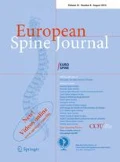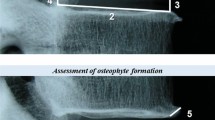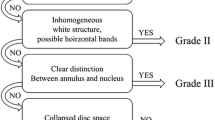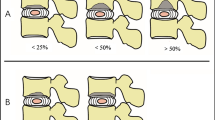Abstract
Many different radiographic grading systems for disc degeneration are described in literature. However, only a few of them are tested for interobserver agreement and none for validity. Furthermore, most of them are based on a subjective terminology. The aim of this study, therefore, is to combine these systems to a new one in which all subjective terms are replaced by more objective ones and to test this new system for validity and interobserver agreement. Since lumbar and cervical discs need to be graded differently, this study was divided into the present Part I for the lumbar and a Part II for the cervical spine. The new radiographic grading system covers the three variables “Height Loss”, “Osteophyte Formation” and “Diffuse Sclerosis”. On lateral and postero-anterior radiographs, each of these three variables first has to be graded individually. Then, the “Overall Degree of Degeneration” is assigned on a four-point scale from 0 (no degeneration) to 3 (severe degeneration). For validation, the radiographic degrees of degeneration of 44 lumbar discs were compared to the respective macroscopic ones, which were defined as “real” degrees of degeneration. The agreement between observers with different levels of experience was determined using the radiographs of 84 lumbar discs. Agreement was quantified using quadratic weighted Kappa coefficients (Kappa) with 95% confidence limits (95% CL). The validation of the new radiographic grading system revealed a substantial agreement between the radiographic and the “real” macroscopic overall degree of degeneration (Kappa=0.714, 95% CL: 0.587–0.841). The radiographic grades, however, tended to be slightly lower than the “real” ones. The interobserver agreement was substantial for all the three variables and for the overall degree of degeneration (Kappa=0.787, 95% CL: 0.702–0.872). However, the inexperienced observer tended to assign slightly lower degrees of degeneration than the experienced one. In conclusion, we believe that the new radiographic grading system is an almost objective, valid and reliable tool to quantify the degree of degeneration of individual lumbar intervertebral discs. However, the user should always remember that the “real” degree of degeneration tends to be underestimated and that slight differences between the ratings of observers with different levels of experience have to be expected.






Similar content being viewed by others
References
Adams MA, Dolan P, Hutton WC (1986) The stages of disc degeneration as revealed by discograms. J Bone Joint Surg Br 68(1):36–41
Althoff I, Brinckmann P, Frobin W, Sandover J, Burton K (1992) An improved method of stature measurement for quantitative determination of spinal loading. Application to sitting postures and whole body vibration. Spine 17(6):682–693
Benneker LM, Heini PF, Anderson SE, Alini M, Ito K (2005) Correlation of radiographic and MRI parameters to morphological and biochemical assessment of intervertebral disc degeneration. Eur Spine J 14(1):27–35
Boos N, Weissbach S, Rohrbach H, Weiler C, Spratt KF, Nerlich AG (2002) Classification of age-related changes in lumbar intervertebral discs: 2002 Volvo Award in basic science. Spine 27(23):2631–2644
Botsford DJ, Esses SI, Ogilvie-Harris DJ (1994) In vivo diurnal variation in intervertebral disc volume and morphology. Spine 19(8):935–940
Brooker AE, Barter RW (1965) Cervical spondylosis. A clinical study with comparative radiology. Brain 88(5):925–936
Chanchairujira K, Chung CB, Kim JY et al (2004) Intervertebral disc calcification of the spine in an elderly population: radiographic prevalence, location, and distribution and correlation with spinal degeneration. Radiology 230(2):499–503
Cheng XG, Brys P, Nijs J et al (1996) Radiological prevalence of lumbar intervertebral disc calcification in the elderly: an autopsy study. Skeletal Radiol 25(3):231–235
Collins DH (1949) The pathology of articular and spinal diseases. Edward Arnold & Co., CO
Coventry MB (1945) The intervertebral disc: its macroscopic anatomy and pathology: Part III. Pathological changes in the intervertebral disc lesion. J Bone Joint Surg (Am) 27:460–473
Coventry MB (1945) The intervertebral disc: its microscopic anatomy and pathology: Part II. Changes in the intervertebral disc concomitant with age. J Bone Joint Surg (Am) 27:233–247
Farfan HF (1973) Mechanical disorders of the low back. Lea & Febiger, Philadelphia
Fleiss J, Cohen J (1973) The equivalence of weighted kappa and the intraclass correlation coefficient as measures of reliability. Educ Psychol Meas 33:613–619
Friberg S, Hirsch C (1949) Anatomical and clinical studies on lumbar disc degeneration. Acta Orthop Scand 19:222–242
Frobin W, Brinckmann P, Biggemann M, Tillotson M, Burton K (1997) Precision measurement of disc height, vertebral height and sagittal plane displacement from lateral radiographic views of the lumbar spine. Clin Biomech (Bristol, Avon) 12(Suppl. 1):S1–S63
Frobin W, Brinckmann P, Kramer M, Hartwig E (2001) Height of lumbar discs measured from radiographs compared with degeneration and height classified from MR images. Eur Radiol 11(2):263–269
Gordon SJ, Yang KH, Mayer PJ, Mace AH Jr, Kish VL, Radin EL (1991) Mechanism of disc rupture. A preliminary report. Spine 16(4):450—456
Hirsch C (1972) Some morphological changes in the cervical spine during ageing. In: Hirsch C, Zotterman Y (eds) Cervical pain. Pergamon Press, Oxford, pp 21–32
Kellgren JH, Jeffrey MR, Ball J (1963) In: The epidemiology of chronic rheumatism. Vol. II: Atlas of standard radiographs of arthritis. Blackwell Scientific Publications, Oxford, pp 14–19
Kellgren JH, Lawrence JS (1952) Rheumatism in miners. II. X-ray study. Br J Ind Med 9(3):197–207
Kettler A, Wilke H-J (accepted) Review of existing grading systems for cervical and lumbar disc and facet joint degeneration. Eur Spine J
Landis JR, Koch GG (1977) The measurement of observer agreement for categorical data. Biometrics 33(1):159–174
Lane NE, Nevitt MC, Genant HK, Hochberg MC (1993) Reliability of new indices of radiographic osteoarthritis of the hand and hip and lumbar disc degeneration. J Rheumatol 20(11):1911–1918
Madan SS, Rai A, Harley JM (2003) Interobserver error in interpretation of the radiographs for degeneration of the lumbar spine. Iowa Orthop J 23:51–56
Mimura M, Panjabi MM, Oxland TR, Crisco JJ, Yamamoto I, Vasavada A (1994) Disc degeneration affects the multidirectional flexibility of the lumbar spine. Spine 19(12):1371–1380
Modic MT, Steinberg PM, Ross JS, Masaryk TJ, Carter JR (1988) Degenerative disk disease: assessment of changes in vertebral body marrow with MR imaging. Radiology 166(1 Pt 1):193–199
Pfirrmann CW, Metzdorf A, Zanetti M, Hodler J, Boos N (2001) Magnetic resonance classification of lumbar intervertebral disc degeneration. Spine 26(17):1873–1878
Resnick D (1985) Degenerative diseases of the vertebral column. Radiology 156(1):3–14
Roberts N, Hogg D, Whitehouse GH, Dangerfield P (1998) Quantitative analysis of diurnal variation in volume and water content of lumbar intervertebral discs. Clin Anat 11(1):1–8
SAS (1999) SAS Institute Inc., Cary, NC, USA
Silberstein CE (1965) The evolution of degenerative changes in the cervical spine and an investigation into the “Joints of Luschka”. Clin Orthop 40:184–204
Thompson JP, Pearce RH, Schechter MT, Adams ME, Tsang IK, Bishop PB (1990) Preliminary evaluation of a scheme for grading the gross morphology of the human intervertebral disc. Spine 15(5):411–415
Töndury G (1972) The behaviour of the cervical discs during life. In: Hirsch C, Zotterman Y (eds) Cervical pain. Pergamon Press, Oxford, pp 59–66
Vernon-Roberts B, Pirie CJ (1977) Degenerative changes in the intervertebral discs of the lumbar spine and their sequelae. Rheumatol Rehabil 16(1):13–21
Vogt MT, Rubin DA, San Valentin R et al (1999) Degenerative lumbar listhesis and bone mineral density in elderly women. The study of osteoporotic fractures. Spine 24(23):2536–2541
Author information
Authors and Affiliations
Corresponding author
Additional information
An erratum to this article can be found at http://dx.doi.org/10.1007/s00586-006-1078-8
Rights and permissions
About this article
Cite this article
Wilke, HJ., Rohlmann, F., Neidlinger-Wilke, C. et al. Validity and interobserver agreement of a new radiographic grading system for intervertebral disc degeneration: Part I. Lumbar spine. Eur Spine J 15, 720–730 (2006). https://doi.org/10.1007/s00586-005-1029-9
Received:
Revised:
Accepted:
Published:
Issue Date:
DOI: https://doi.org/10.1007/s00586-005-1029-9




